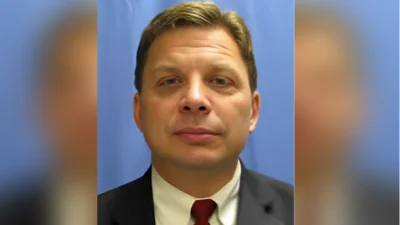The Congressional Record is a unique source of public documentation. It started in 1873, documenting nearly all the major and minor policies being discussed and debated.
“U.S. Supreme Court (Executive Calendar)” mentioning the Environmental Protection Agency was published in the in the Senate section section on pages S3234-S3235 on July 12.
More than half of the Agency's employees are engineers, scientists and protection specialists. The Climate Reality Project, a global climate activist organization, accused Agency leadership in the last five years of undermining its main mission.
The publication is reproduced in full below:
U.S. Supreme Court
Mr. DURBIN. Mr. President, last month the Supreme Court completed one of its most consequential and, in many ways, disastrous terms in American history, issuing a flurry of decisions that have upended our constitutional landscape.
In the scope of just a few weeks, the Supreme Court's radical new supermajority trampled over decades of longstanding precedent and usurped the power that has been traditionally left to Congress, State legislatures, and even individual Americans.
In fact, for the first time in the history of the United States of America, the Supreme Court revoked a constitutional right: the right to reproductive healthcare.
What we have seen from this Supreme Court is not guided by any coherent philosophy. It is judicial activism, plain and simple. The Court's radical majority is cherry-picking its way across text and history to impose their own ideological agenda on the American people, and, in so doing, the majority is not only damaging the Court's constitutional integrity. They are undermining the health and safety of the American people.
Let me explain, starting with one ruling that will severely limit the Government's ability to address what could be the greatest challenge of our time--the climate crisis. The case was West Virginia v. the EPA. The conservative majority on the Court misconstrued the law passed by Congress to side with the fossil fuel industry over the health of the American people.
When Congress enacted the Clean Air Act more than a half century ago, it charged the Environmental Protection Agency with protecting our air from harmful pollution, including greenhouse gases, which are causing catastrophic and irreversible damage to our planet. As Justice Kagan emphasized in her dissent, if the current rate of emissions continues, children born this year could live to see parts of the eastern seaboard of the United States swallowed by the ocean. Rising waters, scorching heat, and other severe weather events can force mass migration, civil unrest, and, in some parts of the world, even failure of state government. And, of course, Black, Brown, indigenous, and other communities bear the largest burden of environmental disaster.
With the Clean Air Act, Congress rightfully recognized that scientists--not politicians or judges--should be the authority on deciding the best methods to reduce emissions from powerplants. It was under that authority that in 2014 the EPA proposed the Clean Power Plan. That plan would have markedly reduced greenhouse gas emissions, but it never went into effect.
That is important because article III of the Constitution requires that there be an actual case in controversy in order for the Supreme Court to issue a ruling. Because the Clean Power Plan never went into effect, there was no case or controversy to refer to, but the Supreme Court still went out of its way to reject the plan and toss it aside in West Virginia v. EPA. Worse yet, the Court claimed it had the authority to do so by relying on something the conservative majority calls ``the major questions doctrine.''
Listen to what Justice Kagan said about this in her dissent:
The current Court is textualist only when being so suits it. When that method would frustrate broader goals, special canons like the ``major questions doctrine'' magically appear as get-out-of-text-free cards.
The ``major questions doctrine'' might sound like a legal word salad, but it will have serious consequences on America. In short, the radical majority on the Court declared it has the authority to veto any Federal regulation it doesn't care for; that is, unless Congress spells out every single detail decades in advance.
Here is the deal. As good as we are in the Senate and the House, lawmakers are not clairvoyant. We write laws like the Clean Air Act to address evolving unforeseen challenges like the climate crisis, and we grant Agencies the power to create regulations to address these challenges based on their singular expertise.
In West Virginia v. EPA, the Supreme Court's radical majority decided that their own ideological goals on the Court were more important than the expertise of the world's top scientists. And with this ruling, the Court has made it clear that they are coming after public Agencies responsible for protecting our public health. They want to weaken the government's ability to work upon behalf of the American people.
Just days before issuing a decision on West Virginia v. EPA, the Court issued another ideologically driven ruling in New York State Rifle & Pistol Association v. Bruen. With this decision, the Court struck down a New York gun safety law that had been on the books for more than a century. That law placed limits on who is allowed to carry a concealed handgun in public. As a result of the law being struck down, it is all but certain that we will see more guns on the streets of America at a time when gun violence has become so bad that the leading cause of death among children in America would be guns.
The Supreme Court's decision to wipe away a century-old gun safety law was troubling enough, but even worse is the new test it laid out for considering constitutional challenges to other gun laws. Justice Clarence Thomas' majority opinion rejected the legal test that lower courts had applied after the legendary Heller case, which sensibly combined historic analysis with present-day public safety considerations. Instead, under Clarence Thomas's reasoning, the majority claims that the only test for whether a gun law is constitutional is historical analysis; that is, whether the current law has a historical analogue.
There is a problem with that in two respects. First, it invites judicial cherry-picking of historical sources, which is exactly what the Clarence Thomas majority did in striking down the New York law. Second, it ignores modern public safety threats posed by firearms which are nothing like the guns that the Framers of the Constitution had in their day.
Think about it. The gun that was fired in the Highland Park Fourth of July parade crowd discharged 90 rounds in just a matter of seconds. No musket in the time of the Founding Fathers was ever used to fire 90 rounds per minute into a crowd watching a Fourth of July parade. There is just no analogue. The Bruen decision was not a triumph of originalism. It was a classic example of runaway judicial activism in furtherance of the far-right ideological agenda, and we have to live in the America that it leaves.
That is not the only ruling in the past term that made America less safe. Earlier today, my Judiciary Committee heard a hearing on the Court's decision in Dobbs v. Jackson Women's Health Organization which revoked the constitutional right to reproductive healthcare for every woman in America.
This decision is one of the most irresponsible rulings in American history. By overturning Roe v. Wade, the majority not only violated five decades of longstanding precedent; they created a healthcare crisis across the country.
Do you realize that every one of these Supreme Court nominees came before this Judiciary Committee and made it clear that they would respect this precedent? And now look at what has happened. Whatever your thoughts on Roe may be, the fact is that it put a profound and personal decision exactly where it should be--in the hands of an individual. Now that the right has been ripped from the American people and handed over to the Government, your constitutional freedoms depend on what State you live in. Your ZIP Code will decide your constitutional right.
You know, for decades, anti-choice activists claimed that overturning Roe would finally settle the controversy surrounding abortion. Instead, this Supreme Court has invited chaos. Pregnant women in America are scrambling at this very moment trying to figure out if they can make it to the nearest clinic to receive lifesaving care as they experience complications during pregnancy. And once again, like the Bruen decision on firearms, the Dobbs decision on abortion is littered with inaccurate historical analysis.
Justice Alito claims that abortion is not constitutionally protected because it is not ``deeply rooted in the Nation's history and tradition.''
I am not sure what history his law clerks have been reading. As the dissenters in the Dobbs case said:
[E]mbarrassingly for the majority--early law in fact does provide some support for abortion rights. Common-law authorities did not treat abortion as a crime before
``quickening''--the point when the fetus moved in the womb. And early American law followed the common-law rule. So the criminal law of that time might be taken as roughly consonant with Roe's and Casey's different treatment of early and late abortions.
Just look at one of our Founding Fathers, Benjamin Franklin, who actually published a textbook that included an at-home abortion recipe.
So the Dobbs decision is not based on any originalist interpretation of the Constitution or any precedent. It is an ideologically motivated outcome in search of a legal rationale.
This assault on our fundamental freedoms won't end there. The Supreme Court has already signaled they are just getting started. During today's hearing on the overturning of Roe v. Wade, we discussed Justice Clarence Thomas' concurring opinion in Dobbs, in which he argues that the constitutional right to privacy is a fiction.
In that opinion, he declares that the Court should ``eliminate'' the line of cases guaranteeing the constitutional rights to birth control, marriage equality, and consensual relations between LGBTQ people. There is good reason to take this threat seriously.
Based on the cases the Court has agreed to hear in its next term, which begins in October, it is clear that the majority is once again seeking opportunities to impose its far-right agenda on the American people.
The Court is considering one case that could allow individuals and businesses to openly discriminate against LGBTQ people. Another case will revisit the question of affirmative action in higher education, and, most concerning, this Court will consider a case that could threaten American democracy as we know it. They will decide whether a State legislature can disregard the will of the voters in their State to appoint a slate of electors who support the losing Presidential candidate. The Presiding Officer knows this issue well from the State of Michigan's experience just a few months ago.
There is a reason why a record number of Americans say they have lost faith in the Supreme Court based on what happened in this term that just concluded. And now they are living in fear that their most cherished rights--basic human rights in America--are on the conservative chopping block.
The tragic irony is that it was Chief Justice Roberts who once said that ``justices . . . are like umpires. . . . They make sure everybody plays by the rules, but it is a limited role.''
I remember that quote, as I was sitting in the Judiciary Committee when he made it, and I thought the limitation that he suggested for the Supreme Court was an indication of his moderation.
The Court that he has joined, in many of these opinions, is not a Court of limited or moderate means. I wish I could say that that, in fact, were true today. It is not. This radical majority is not comprised of umpires calling balls and strikes. They are, in fact, judicial activists--unelected judges--who are actively undermining the rule of law in America, and there is more to come.
I yield the floor.
The PRESIDING OFFICER. The Senator from Illinois.
____________________




